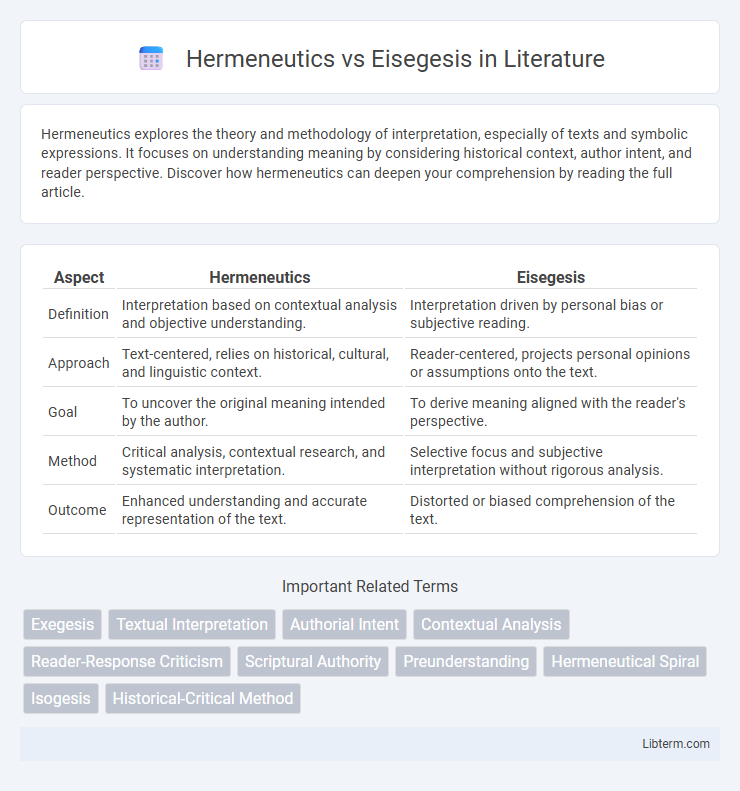Hermeneutics explores the theory and methodology of interpretation, especially of texts and symbolic expressions. It focuses on understanding meaning by considering historical context, author intent, and reader perspective. Discover how hermeneutics can deepen your comprehension by reading the full article.
Table of Comparison
| Aspect | Hermeneutics | Eisegesis |
|---|---|---|
| Definition | Interpretation based on contextual analysis and objective understanding. | Interpretation driven by personal bias or subjective reading. |
| Approach | Text-centered, relies on historical, cultural, and linguistic context. | Reader-centered, projects personal opinions or assumptions onto the text. |
| Goal | To uncover the original meaning intended by the author. | To derive meaning aligned with the reader's perspective. |
| Method | Critical analysis, contextual research, and systematic interpretation. | Selective focus and subjective interpretation without rigorous analysis. |
| Outcome | Enhanced understanding and accurate representation of the text. | Distorted or biased comprehension of the text. |
Defining Hermeneutics: Principles and Purpose
Hermeneutics involves the systematic interpretation of texts, emphasizing the original context, authorial intent, and the meaning intended by the text itself. Its principles include the analysis of linguistic structures, historical background, and cultural context to uncover the authentic message of a passage. The purpose of hermeneutics is to provide an objective and coherent understanding that faithfully represents the text's true significance.
Understanding Eisegesis: Meaning and Implications
Eisegesis refers to the interpretation of a text by reading one's own ideas, biases, or presuppositions into it, rather than drawing meaning from the text itself. This approach often leads to distorted or subjective understanding, undermining the original intent and context of the material. Recognizing eisegesis is crucial for accurate hermeneutical analysis, ensuring interpretations remain faithful to the text's authentic message.
Key Differences Between Hermeneutics and Eisegesis
Hermeneutics involves interpreting texts, especially religious or philosophical, by seeking the original meaning intended by the author, emphasizing context, culture, and linguistic nuances. Eisegesis, conversely, imposes the interpreter's own biases or opinions onto the text, often distorting its original meaning. The key difference lies in hermeneutics aiming for objectivity and faithful understanding, while eisegesis represents subjective or biased interpretation.
Historical Development of Hermeneutics
Hermeneutics evolved from its origins in ancient philosophy, particularly through the works of Plato and Aristotle, into a formal discipline during the Protestant Reformation as scholars sought objective methods for biblical interpretation. The 19th century brought significant advancements with Friedrich Schleiermacher emphasizing understanding the author's intent and Wilhelm Dilthey expanding hermeneutics to the human sciences. This historical development contrasts sharply with eisegesis, which projects personal biases onto texts rather than uncovering original meaning through contextual analysis.
Common Examples of Eisegesis in Interpretation
Common examples of eisegesis in interpretation include reading personal biases or preconceived notions into a text, imposing contemporary values on historical scriptures, and selectively quoting passages to support a particular agenda. This practice often leads to distortions in meaning, such as interpreting ambiguous verses to align with modern political or social views rather than the original context. Eisegesis contrasts with hermeneutics, which seeks to uncover the authentic meaning of a text through careful analysis of language, culture, and historical background.
The Importance of Context in Hermeneutics
Hermeneutics emphasizes the critical role of context, including historical background, author intent, and cultural factors, to accurately interpret texts, ensuring meanings emerge from the text itself. Eisegesis disregards this, imposing personal biases and external interpretations that distort the original message. Contextual analysis in hermeneutics safeguards textual integrity by aligning interpretation with the intended significance of biblical, literary, or legal documents.
Dangers and Consequences of Eisegesis
Eisegesis poses significant dangers by imposing personal biases and preconceived ideas onto a text, leading to misinterpretation and distortion of its original meaning. This subjective approach undermines the credibility of biblical or literary analysis, often resulting in flawed theological conclusions and misinformation. Overreliance on eisegesis can erode scholarly integrity, causing confusion among readers and misguiding ethical or doctrinal teachings.
Hermeneutical Methods vs. Eisegetical Approaches
Hermeneutical methods prioritize objective interpretation by analyzing the historical context, linguistic structure, and authorial intent to uncover a text's original meaning. Eisegetical approaches impose the reader's subjective biases or presuppositions onto the text, often leading to distorted or personalized readings. The distinction highlights the importance of rigorous exegesis in disciplines like theology and literary studies to ensure faithful and accurate understanding.
Avoiding Eisegesis: Best Practices for Accurate Interpretation
Avoiding eisegesis requires adhering closely to the original context, language, and cultural background of the text to ensure accurate interpretation. Employing hermeneutical methods such as historical-critical analysis, examining authorial intent, and cross-referencing scripture or literature prevents personal biases from distorting meaning. Effective use of lexical tools, awareness of genre, and consulting scholarly commentaries further enhance faithful understanding and reduce subjective misreadings.
The Impact of Hermeneutics and Eisegesis on Faith and Scholarship
Hermeneutics, centered on critical interpretation and contextual analysis, fosters deeper understanding and scholarly rigor in theological studies, influencing faith by encouraging reflective engagement with sacred texts. Eisegesis, which involves imposing personal biases or preconceptions onto a text, often distorts original meanings, potentially leading to doctrinal errors and weakened academic credibility. The contrasting impact of hermeneutics versus eisegesis underscores the importance of disciplined exegesis in maintaining integrity within both faith communities and scholarly research.
Hermeneutics Infographic

 libterm.com
libterm.com